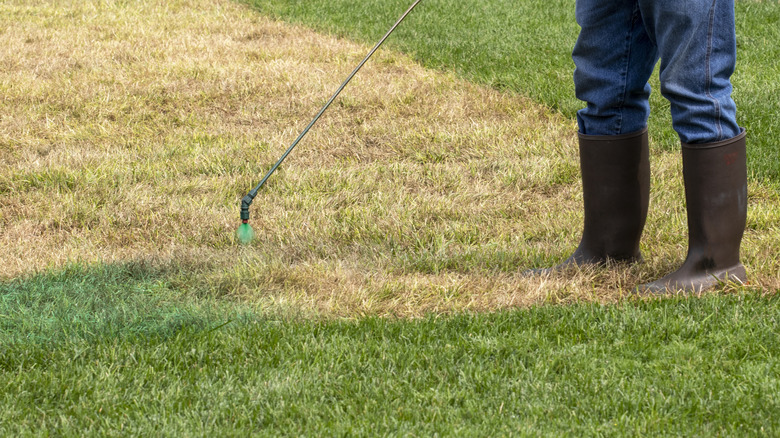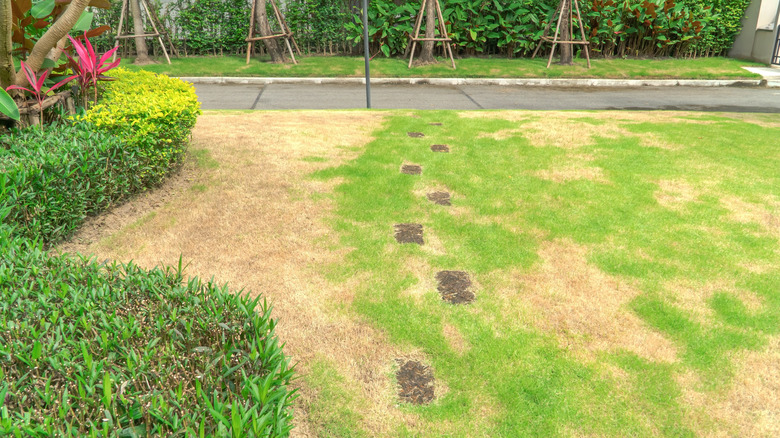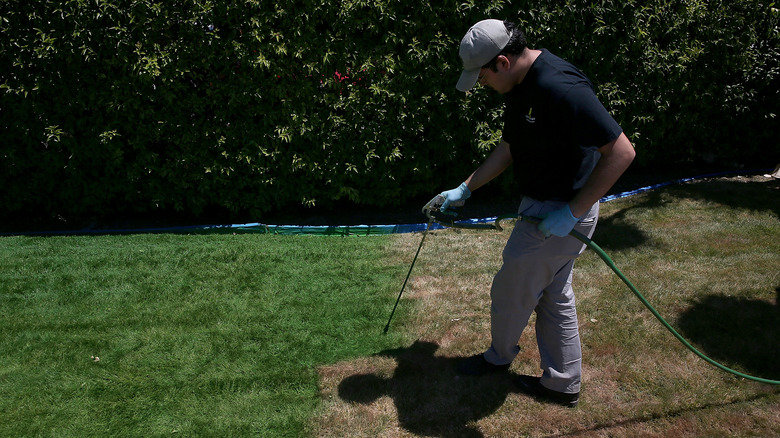What To Consider Before Painting Your Lawn With Turf Colorant
Whether you want to increase the value of your abode or simply take pride in your home, you may be looking for ways to make your grass look greener. Although you could always spread some fertilizer on your lawn or put down new sod, there's another option that's both quick and easy. We're referring to turf, or, more specifically in this case, turf colorant, which isn't exactly the same thing even if it has the same goal: faking your way to nice, green grass.
Also known as turf paint and grass paint, colorant does exactly what you might assume. That is, you can use it to literally paint your lawn. Although this might seem a little strange if it's new to you, it happens to be a handy option that offers a few other perks. Along with turning your grass to whatever color of green you desire thanks to the fact that it's sold in a wide range of shades, it's also made to be durable and doesn't come off the blades in the sun or rain. On top of that, many kinds of turf paint use ingredients that are nontoxic, biodegradable, and safe for the environment.
Of course, you might also be intrigued by the fact that turf colorant can be a much more affordable option than attempting to fix your grass in other ways.
Reasons to use turf colorant on your lawn
Why might your yard need help from turf colorant? There are various reasons, but all lead to the same unfortunate result: grass turning an unpleasant shade of brown. Disease, fungus, and problematic critters can all harm your grass. Beyond that, if your property doesn't get a lot of sunshine or the pH level of your soil is imbalanced, then your grass may suffer. The same goes for a property where children play (and can wear it down) or that's regularly subjected to dog waste.
There are also seasonal issues that can pop up. In the summer, your lawn can turn brown if you cut the grass too much and too short, which makes the tiny plants think it's time to go dormant for the year. If you live in an area that gets cold weather in the winter, then your grass will naturally lose some of its luster until spring comes again. Although this can be a temporary situation, it's also unsightly and not something you want if you're trying to sell your house or impress the neighbors.
Fortunately, by determining the cause behind why your grass is looking so dire, you can make sure to choose the kind of turf colorant that will be best for the job. Choosing the right product is important since there are a few factors that might make this job relatively affordable or rather pricey.
The cost of turf colorant can vary
Before you run out to buy the first turf colorant you come across at the store and start spraying it all over your lawn, you need to keep in mind that you can make a few choices that can seriously affect the cost. That includes the fact that different products use different formulas for specific situations.
For instance, you need to consider what kind of paint is right for your particular kind of grass; some shades work better for warm-season grasses, while others are more suited to cool-season grasses. You also need to know if your existing grass is totally dead or if some is still holding on. On top of that, don't forget to figure out what's involved in the application process and how long it will take. The latter will also depend on how much grass you need to cover. This is definitely a detail that you want to have fully figured out because it can have a big impact on what you end up paying.
Depending on the size of your lawn, what you need to have painted, and what kind of formula you use, the cost can range from $200 all the way up to $1,000 per acre. The final price will either be higher if you have a professional apply the colorant or lower if you opt to do it yourself. Choose what's best for you and your yard.


